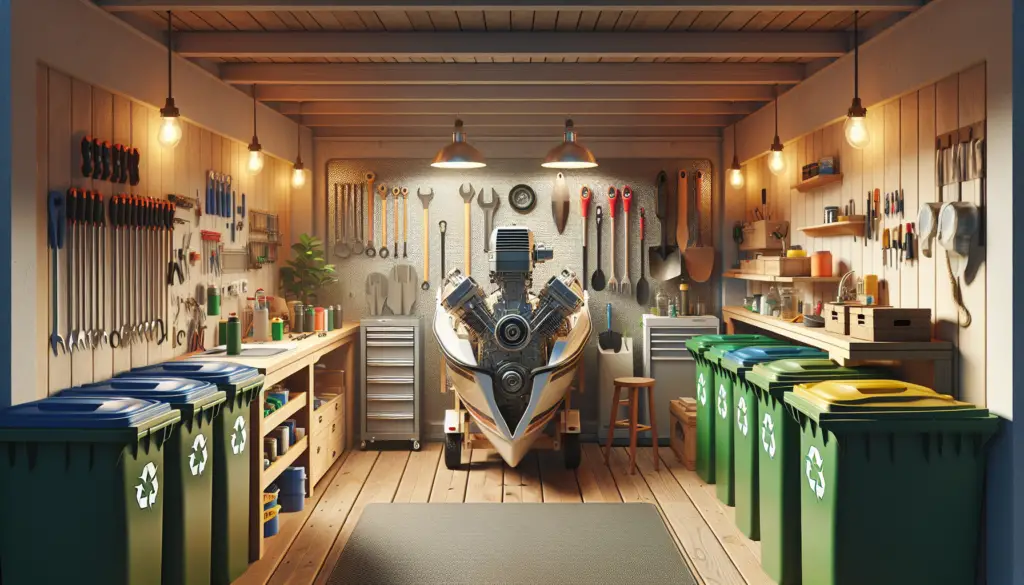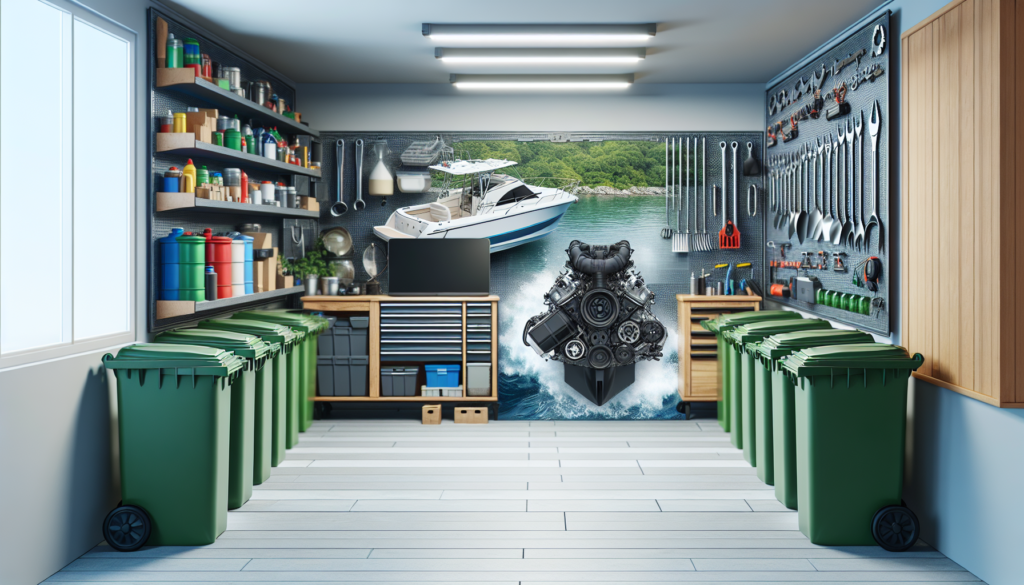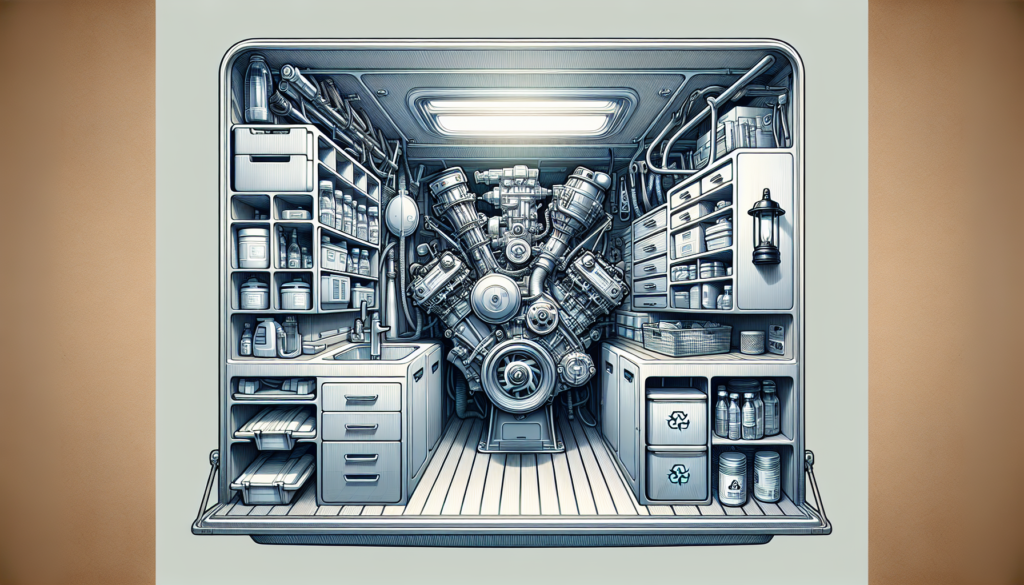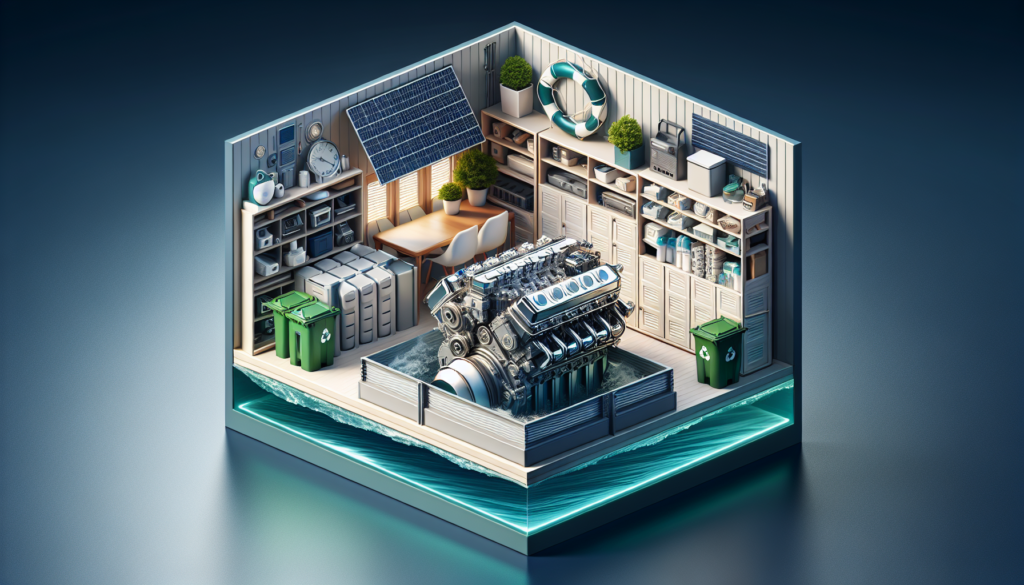Keeping your beloved boat in pristine condition can be quite a task, especially when it comes to the maintenance and storage of the engine. This article offers invaluable advice on how you can streamline this process, reduce clutter, and improve the overall lifespan of your marine engine. We’ll explore ways to minimize your boat engine’s downtime, offer solutions for efficient storage, and share expert tips to lessen environmental impact. By the end of this article, you’ll have a plethora of useful info that will turn you into a seasoned boat owner, adept at managing your engine’s maintenance and storage needs.

Understanding Boat Engine Maintenance
The health and performance of your boat have a lot to do with the care of its engine. Understanding the basics of boat engine maintenance is not only essential for harvesting the maximum power and longevity out of the engine but also for reducing harmful emissions and environmental footprint associated with boating activities.
Basics of boat engine care
Boat engine care involves a wide range of activities. It starts from the very basic steps like keeping the engine clean to more technical tasks like oil changes, filter replacements, and tune-ups. The idea is to ensure smooth operation, longevity, and lower pollution levels.
Regular checks and preventive maintenance
Just like any machinery, boat engines require regular checks and preventive maintenance. Routine inspection and timely intervention can help you avoid serious damage and costly repairs. Preventive maintenance also plays a vital role in minimizing the environmental footprint as a well-maintained engine operates more efficiently and releases fewer pollutants into the atmosphere.
Common engine issues and resolutions
Being observant of your boat engine’s performance could save you a lot of trouble. The common engine issues include overheating, lack of power, the engine not starting, and loud noises during operation. Keys to resolving these issues include proper diagnosis, timely maintenance, using better quality fuels, and ensuring that all engine parts are running smoothly.
Reducing Environmental Impact of Maintenance
The maintenance of boat engines can have significant environmental impacts if not done responsibly. However, some strategic choices can go a long way in mitigating this.
Using eco-friendly products
Choosing eco-friendly maintenance products, like biodegradable oils and cleaning solutions, can make a huge difference. These products are formulated to decompose naturally without harming marine life or polluting the water.
Proper disposal of used engine oil
Improper disposal of used engine oil is a significant source of water pollution. You can prevent this by ensuring that used oil is either recycled or responsibly discarded at designated disposal facilities.
Reducing runoff into water bodies
Maintenance activities often involve a lot of cleaning. If not properly managed, the cleaning runoff loaded with chemicals can end up in water bodies, causing pollution. Using biodegradable cleaning products and minimizing water use can significantly reduce this runoff.

Routine Maintenance Techniques for Decreased Footprint
By choosing environmentally friendly techniques for routine maintenance, you can significantly decrease your carbon footprint.
Implementing regular engine tune-ups
Regular engine tune-ups ensure optimal engine performance and fuel efficiency, resulting in less pollution. These tune-ups mainly include adjusting the ignition timing, cleaning or replacing the spark plugs, and replacing the air and fuel filters.
Maintaining proper fuel-to-air ratio
Maintaining a proper fuel-to-air ratio in the engine can reduce emissions significantly. It ensures that not just all fuel is burned but also burnt optimally, which results in lesser emission of harmful gases.
Reducing engine idling
Unnecessary engine idling not only wastes fuel but also contributes to air pollution. By reducing idling time, you can save fuel and reduce emissions.
Boat Engine Storage Basics
Proper storage of boat engines can drastically increase their lifespan and efficiency.
Importance of proper storage
Proper storage of boat engines protects them from rust, corrosion, moisture damage, and other environmental hazards. It also ensures smooth operation when you’re ready to use the boat again.
Common boat engine storage techniques
Common boat engine storage techniques include indoor storage, outdoor storage, and the use of engine covers. Each technique has its advantages and challenges depending on factors like space availability and climatic conditions.
Challenges in engine storage
Engine storage comes with a few challenges, including space constraints, threat from pests, and climatic damage. Good planning and management can help overcome these challenges.

Sustainable Boat Engine Storage Solutions
As part of the initiative to minimize the environmental footprint, sustainable engine storage solutions are being adopted more and more.
Utilizing compact storage facilities
Compact storage facilities are designed to accommodate more engines in a smaller area, reducing the land usage and associated environmental impacts. They also often use sustainable design and operating practices to further minimize their footprint.
Indoor vs outdoor storage – which is more sustainable?
Between indoor and outdoor storage, indoor storage is usually more sustainable due to better control over environmental factors. Indoor units typically require less energy for climate control and are better protected against weather-related wear and tear.
Ensuring minimal evaporation from stored engines
Fuel evaporation from stored engines can contribute to air pollution. To minimize this, it’s essential to keep the fuel tanks well-sealed during storage.
Energy Efficiency in Maintenance and Storage
Increasing energy efficiency in maintenance and storage practices can further reduce the environmental impacts of boating activities.
Using energy efficient tools for maintenance
With advancements in technology, energy-efficient tools have become widely available. Using these tools for maintenance activities can save energy and reduce your carbon footprint.
Solar-powered storage facilities
Utilizing solar power for engine storage facilities is an excellent initiative towards sustainability. It not only decreases the reliance on conventional electrical power but also reduces greenhouse gas emissions.
Minimizing power use during storage
Efficient storage setups and practices, like using compact storage units, effective insulation, and energy-saving appliances, can minimize power use during storage.

Waste Management during Maintenance and Storage
Proper waste management can greatly enhance the sustainability of boat engine maintenance and storage activities.
Proper discarding of engine parts
Again, the environmental threat posed by the irresponsible disposal of old or damaged engine parts is substantial. This can be addressed by ensuring proper disposal at designated facilities or through recycling where possible.
Minimizing waste through preventive maintenance
Preventive maintenance not only increases engine longevity but also leads to fewer replacements, hence less waste. The idea is to fix or prevent issues before they become serious enough to warrant part replacements.
Recycling initiatives in boat engine maintenance
The boat maintenance industry, like many others, is increasingly embracing recycling. Initiatives range from recycling engine oil to engine parts, significantly reducing the waste generated.
Legal Aspects and Regulations
Boat engine maintenance and storage are governed by several laws and regulations, which are mainly aimed at achieving environmental sustainability.
Understanding marine pollution laws
Marine pollution laws set limits on the types and amounts of pollutants boats can release into water bodies. Understanding these laws can help you ensure compliance and reduce your boat’s environmental impact.
Legal implications of improper boat engine maintenance
Improper boat engine maintenance can lead to excessive emissions or oil spills, both of which carry legal consequences. Being aware of these implications can motivate you to adopt better maintenance practices.
Regulations regarding engine storage
Engine storage regulations are primarily aimed at preventing environmental hazards like fuel leaks, fire outbreaks, and land misuse. Following these regulations can promote sustainability and also save you from potential fines and lawsuits.
Safety Measures for Sustainable Maintenance and Storage
Implementing safety measures can help reduce the environmental impact and ensure personal safety during engine maintenance and storage.
Safe handling of engine oil and fuel
This involves using proper containers for oil and fuel, cautious transportation and storage, and responsible disposal to prevent spills, leaks, and accidents.
Storing engines in secure, hazard-free areas
Engine storage areas should be free from fire hazards and pests. This not only protects the engines but also the environment from potential spills, leaks, or fires.
Fire safety precautions during maintenance and storage
Engines being highly combustible equipment, it’s important to follow fire safety precautions. This includes maintaining a safe distance from open flame sources, using fireproof engine covers, and having fire extinguishers nearby.
Educating Boat Owners and Operators
Education is a powerful tool for promoting sustainable practices amongst boat owners and operators.
Importance of sustainability awareness for boat owners
An increased awareness about the environmental impacts of boating activities can motivate boat owners to adopt more sustainable practices and make responsible choices.
Offering workshops and training on sustainable engine maintenance
Workshops and training programs can equip boat owners and operators with practical knowledge and skills for implementing sustainable maintenance practices.
Creating an informational guide on minimal footprint maintenance and storage
Having an easily accessible, comprehensive guide can serve as a continual reference for boat owners, empowering them to minimize their footprint from engine maintenance and storage activities. This guide could include everything from selecting eco-friendly products to understanding legal regulations.

